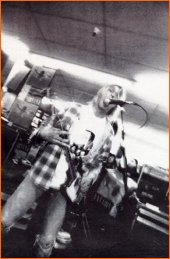|
The members of Nirvana seem frustrated by their present fame, which could very well keep growing. Yet, having made the decision to sign to a major label, shouldn't the band have been able to predict the possible outcome of exposure before they signed? "We really had no choice," says Cobain. "Geffen isn't pushing us as much as they could - they could be blowing our promotion out or the water. But if it gets too out-of-hand, I could easily destroy our careers in a day; it doesn't mean that much to me. "Chris, Dave and I have a great relationship, we're best friends, and we like to play music together," he continues, lightening up his tone. "If we became too popular, we'd probably just change our band name, get plastic surgery, dye our hair, grow mustaches and play the same music we're playing now." If Nirvana were to start all over again, at least this time around they wouldn't have to re-learn their instruments. You'd almost understand if Cobain couldn't bring himself to strum along with "My Best Friend's Girl" by the Cars, the first song he taught himself to play. "I went to a guitar teacher for one day," Cobain says, continuing the story. "I learned how to play 'Back In Black' by AC/DC and found out about power chords. With power chords you could play just about anything. So I never went back." During his youth, Cobain lived with aunts, uncles and grandparents who constantly moved him back and forth between Montesano and Aberdeen, two small towns in Washington. "It's very typical, like an evil-stepmother scenario. I just couldn't meet the demands of my parents," he says. "They wanted me to be into sports and stuff like that." Changing schools all the time made it difficult for Cobain to make friends. "I couldn't relate to people at all, so I basically hung out by myself all the time and played guitar." He finally met one intriguing guy in a high school art class, someone who always carried around books on the Sex Pistols and the Who. He turned out to be Buzz Osborne, eventual founder of the Melvins, a band many people credit with helping to inspire the characteristic metal style that bands from the Pacific Northwest are known for. "We started going to shows together, and I remember the first one I went to was DOA," Cobain says. "I sold my whole rock record collection for $12 so I could see them; it was worth it. "My second show was Black Flag," Cobain continues. "After that show, I claimed I would forever be a punk rocker. The next day, I spiked my hair and started spray-painting people's cars." Cobain claims to have gone to prison a couple of times for vandalism. Through the Melvins, Cobain met Novoselic, who also had trouble relating to his high school peers. Having moved from Los Angeles to the small logging community of Aberdeen when he was 14, Novoselic grew so depressed about the upheaval that he went to live with relatives in Yugoslavia for a year. Once home in Aberdeen, Novoselic met Cobain through Osborne. "Kurt was fun to party with," he says. "We're both analytical pothead philosophers." Cobain still likes Novoselic for the same reasons he liked him then: "He's a very funny guy," Cobain says. "Loud, obnoxious - and we like the same music, which is always a big attraction." The songs Cobain eventually wrote and recorded with Dale Crover of the Melvins so impressed Novoselic that he asked Cobain if he wanted to start a band In 1987- Cobain, having already declined a scholarship to art school, accepted his offer. "it made me feel special," Cobain says. "it was exciting to be a 'subversive' type of person in a town where there wasn't anyone like that." Choosing a band name took more time than joining up did: Nirvana's first five or six shows were played under different names, including Pen Cap Chew, Ted Ed Fred, Dope Hippy and - strangely enough - Skid Row. For obvious reasons they settled on Nirvana. When they got enough songs together to record a demo, they booked time at Reciprocal Recording with producer Jack Endino, who, unbeknownst to them, later gave a copy of their tape to Sub Pop. Within a few months, Nirvana was signed and had released their first single, "Love Buzz/Big Cheese." Their first full-length album, Bleach, came out in 1989, and was followed by two EPs, "Blew" and "Sliver/Dive." No one can be sure, it seems, how many drummers have done stints with Nirvana over the years, but Novoselic guesses it's somewhere between three and five. It wasn't until 1990 that the band found the drummer they really wanted, but - much the way these things often turn out - he was already taken. Novoselic and Cobain saw Scream, a Washington D.C.-based punk band, in San Francisco, and extended an invitation to drummer David Grohl through their mutual friend Buzz Osborne. When Scream's bass player unexpectedly quit, Grohl happily applied to Nirvana. "Now if Dave leaves the band," says Novoselic, 'we're just gonna break up." Novoselic can make light of Nirvana's breaking up someday because, given good material, he claims he'd stick with the band forever. But the other band members have differing thoughts about Nirvana's longevity. Grohl says he can't envision the future. Cobain seems genuinely concerned about the group becoming too popular, but he's careful about assuming that they will. "I don't know what's gonna happen," Cobain says. "Think of all the other bands that have been really popular and on the national charts for a short time: Kajagoogoo, Adam Ant, the list goes on and on. "So we could be just a flash in the pan," he says. "Actually, I hope we are." |

|
|
< END > Main Page | Interviews |
|